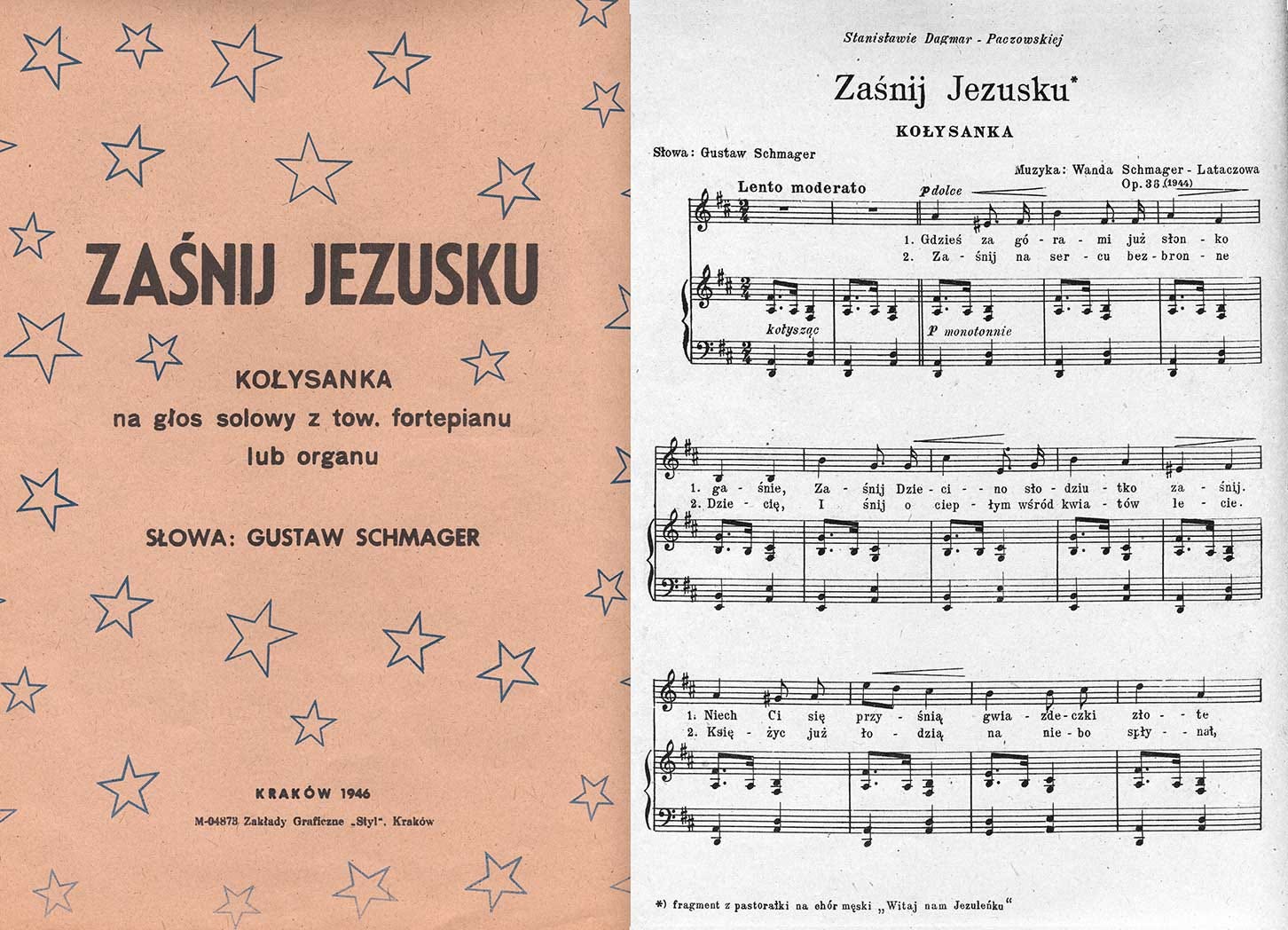Have you ever encountered a situation where you suddenly found yourself to be the custodian of a document or artifact and had no idea how you happened to come into its possession? I had such an experience after searching through stacks of letters, newspapers, and other memorabilia that were stored in my closet.
LIBRETTOS THAT SEEMINGLY CAME OUT OF NOWHERE
While I have been an avid collector of recorded music for many decades, I am not a musician or proficient at figuring out the notes, chords, and scales displayed on a piece of sheet music. I did a double-take recently when I stumbled upon two librettos that were published in Krakow, Poland in 1946 where the words and music were provided by Gustaw Schmager and Wanda Schmager-Lataczowa (whom I presume were married). I was puzzled by having these documents in my possession, since I am not of Polish descent or have family ties to that country.
Taking advantage of Internet search engines, I discovered that these two music sheets are listed on a site called The Library of Polish Songs (Bibliotece Polskiej Piosenki). That same website also provided their English language translations:
Why are you? (Czemuzes Ach Czemu): Carol for solo voice accompanied by a piano or organ, Krakow, 1946.
Sleep Jesus (Zasnij Jezusku): A lullaby for a solo voice with piano or organ accompaniment, Krakow, 1946.
MOST LIKELY SOURCE
While I have never visited Poland, I have been to Russia (in 1988 and 1992). I am inclined to believe that one of the Russians whom I spent time with in 1992 gave me those librettos as a parting gift. I've narrowed my primary candidates to these individuals:
Dmitri and Ksenya - July 24-29, 1992
During my 5-day stay in Moscow, this couple graciously provided me with food and lodging in exchange for hard currency. Dmitri participated in a few of the organized sightseeing activities, such as a visit to the Izmailovo Flea Market in Moscow. In addition, Dmitri was instrumental in helping me purchase a Russian-English dictionary at one of the local bookstores.
Maxim K - July 25, 1992
During my first visit to Moscow in 1988, a fellow tour group member named Betty introduced me to Maxim, who was employed at that time as a Russian-Japanese translator. For several years thereafter, I kept in contact with Maxim by mail. When Maxim learned of my 1992 tour to Moscow, he invited me to be a dinner guest at his parents' flat. Before dinner, Maxim played Beethoven's Für Elise on the home piano. Much to the amazement of my Moscow home hosts, I successfully completed my nighttime visit with Maxim and his parents by taking the underground Metro and listening intently to the names of each of the train stops that were being announced in Russian.
Olga Y. - July 31, 1992
By the end of 1988, Olga and I had begun to correspond regularly by mail as a result of a Soviet Union trip that I had taken in October when she had befriended me and many other tour members when she was employed as a school teacher in St. Petersburg (note: Olga also plays the piano). During my second visit to Russia in 1992, Olga invited me to spend social time at her parents' flat in St. Petersburg to celebrate her mother's 55th birthday.
Karl and Emma - August 2, 1992
This St. Petersburg couple graciously served as my chaperone during a private tour of the city. A year earlier, I became one of the Americans who helped their daughter Masha become acclimated to living in Oakland, California. Masha was fortunate to have obtained employment with a paying job, and she entrusted me to hand deliver a portion of the money that she earned to her parents so they could use it as hard currency.
MAXIM'S MOTHER IS ALSO A POSSIBLE SOURCE
In the spring of 1991 (a year before my second tour of Russia), Maxim's mother, Eleanora, flew to the United States and spent a few days in the San Francisco Bay Area. Eleanora speaks and understands English and corresponded regularly with Betty, my 1988 tour companion whom I referenced earlier. Betty made arrangements so that the three of us could meet and socialize at Golden Gate Park in San Francisco. It's possible that Eleanora carried the music sheets in her luggage and gave them to me before departing.
CONCLUSION
While circumstantial evidence seems to suggest that one of my Russian contacts as the source of the postwar librettos that are in my possession, I cannot rule out the possibility that I obtained them elsewhere at a different time and place. Right now it remains a mystery.





